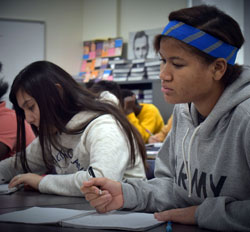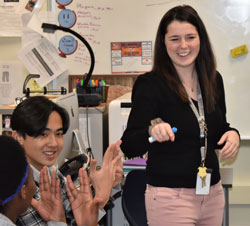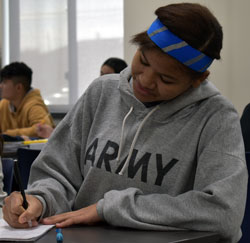Mary Campbell was getting her Kelloggsville High School class settled in. It was 9 o’clock on a Monday morning, and her students were a little restless, still getting back into school mode after a weekend away.
She looked around the room. “Are we good?” she asked, eyebrows slightly raised, the question not really a question.

“Five more minutes?” replied a student.
“Five more minutes?” answered Campbell with a smile. “Definitely not.”
It was time to teach, and Campbell was eager to get going.
The class was Newcomers English and for the next hour, Campbell and 22 English Learner students from Vietnam, Mexico, Honduras, Guatemala, Dominican Republic, El Salvador, Rwanda and the Congo would be working on a series of basic language skills.
First there was a little exercise in which Campbell had the students call out the answers to questions about the day of the week, the weather and the temperature outside. Then there was some capitalization practice, and finally it was time for a student highlight: “Mingle Monday.”
In Mingle Monday, students move around and sit with different classmates, and Campbell takes them through a series of questions, walking around the room all the while. After she introduces each question, the students record the answer of the student sitting across from them in their notebooks.
“Using complete sentences,” noted Campbell. They interact with a different student for each question as the inner circle moves one spot over while the outer circle stays in place.

Practicing Multiple Skills, Having Fun
Campbell is an Aquinas College graduate and received her endorsement in ESL K-12 (at Kelloggsville the preferred term is EL, not ESL because, teachers say, most of their students are not learning a second language when they learn English but are often learning a third or fourth).
The main purpose of something like Mingle Monday, Campbell said, is for the students to be able to practice multiple skills at once – reading, writing, listening and speaking – and have some fun while doing so.
“It really is a fun activity that gets students engaged,” she said. “They’re interacting with their peers but most importantly, practicing their English.
“One of the benefits that has surprised me the most is how much Mingle Monday has improved the relationships between students in the classroom. Students who would normally never interact with one another are fist bumping, congratulating and celebrating one another on their journey to mastering the English language.”
Many of the questions are fun and intended to both provoke a smile from students, and to get them thinking about their answers. During a recent Mingle Monday, Campbell showed the class a slide with a picture of “Star Trek” character Spock, and her question, to which the students needed to provide a written response, was “Can you make the Spock sign?”
Of course, to answer the question, the room quickly became abuzz with students trying to make the strange sign, rapidly talking in their native languages of Spanish, Swahili, Vietnamese and Kinyarwanda and laughing at their success or futility and that of their classmates.
As she pointed with her right hand at Spock on the slide, Campbell made the sign with her left and said: “In the movie – it’s called “Star Trek” – this man does this and says, ‘Live long and prosper.’ And for some reason I can only do the sign with my left hand.”

Short Stories and Gilligan’s Island
A few doors down from Campbell’s class, fellow EL teacher Susan Faulk was working with 26 students from such countries as Honduras, Gambia, Togo, Burundi, Dominican Republic, Mexico, Myanmar, Cuba and Vietnam.
The project this day was an essay comparing the 1924 short story “The Most Dangerous Game” (about a big-game hunter who becomes the hunted on what he thinks is a deserted island) to a 1967 episode of the TV show “Gilligan’s Island” called “The Hunter” (in which a big-game hunter comes to the island, finds no game to hunt and decides to pursue Gilligan instead).
“It’s a classic short story,” Faulk said, “a great story to use to teach literary elements like suspense, foreshadowing, simile, metaphor and personification.”
Faulk, who grew up watching “Gilligan’s Island” reruns, said it’s a surreal experience for her students, who hail from so many countries outside the U.S., to watch an iconic piece of American television from more than 50 years ago. But she said the juxtaposition of the short story with a 30-minute TV show works well for what she’s trying to get the students to accomplish since she uses a reader’s theatre version of the story and also excerpts from the original story.
After reading the play and excerpts, Faulk works with her students on short story analysis. They then watch the episode, and discuss how the story and the TV show are similar and how they are different.
All of that then leads to a five-paragraph essay about which is the more effective story.

Big Changes in Recent Decades
For Faulk, thinking about new ways to give students tried-and-true skills comes with the territory.
She’s in her 14th year at Kelloggsville and has seen big changes during that time. When she began, the school served a small number of EL students, maybe 15 or so each year, she said, and she was a little more than half-time with EL students. Now she’s full-time EL and has two colleagues in Campbell and Shannon Dahlquist, who are a little over half-time and almost full-time EL, respectively.
Together the trio teaches or co-teaches 12 sections of EL classes or classes that have EL support for 75-80 EL students, some 10 percent or more of the student body. Those students are at various levels of English understanding and proficiency. Some know almost no English. Others, Faulk said, know conversational English but need a lot of work with reading and writing. And some know conversational English, but are still developing their academic English.
At Kelloggsville, even the advanced students read at an elementary school level since, Faulk said, studies show it takes an average of two years for a person to learn conversational English if they are immersed in the language, and four to seven years for academic language to develop if they are immersed in academic language.

It Takes a Village
In the co-teaching model, Faulk, Campbell and Dahlquist all teach some classes that are just for EL students. Each also co-teaches classes in non-English subject areas that are still completely comprised of EL students.
So, after her English Language Arts for ELs class, Faulk goes to a civics class that she co-teaches. In that class, she can help adapt assignments, assist the civics teacher with the EL students (all of whom Faulk knows well) and generally be a bridge between the students and the subject matter. Campbell and Dahlquist do the same in other subject areas, including world history, earth science, chemistry and algebra.
“Our co-teaching model is one of the best things we do for ELs,” said Faulk. “Through this model, students receive academic content in core subjects in a way that is accessible for them. The content area teacher teaches the content. The EL teacher comes alongside the content area teacher to use strategies and scaffolding to make the content understandable for ELs.”
Kelloggsville also provides a Parent English Program on Monday nights, and offers the Home/Heritage Language Assessment so that immigrant and refugee students can earn two world language credits by demonstrating proficiency in their own language. Faulk noted that the district also works with a variety of area refugee agencies, pastors and more to make sure it is doing all it can to serve its growing population.
The influx of students from other countries has also provided opportunities for other Kelloggsville employees, according to Faulk. Last year the high school had two young men come through schools of choice. They had already attended two different high schools and were classified as juniors. Counselor Bethany Hardy asked them for their transcripts from Africa because they weren’t accounted for in their records, and when they brought in those transcripts, it turned out they could actually be seniors and had enough credits to enter the Kelloggsville school-to-work program, administered by John Linker.
In January 2019, they were able to start working for Lacks Enterprises and earning money for their families, and at the end of the school year, Lacks signed them on full time at a special signing ceremony Kelloggsville hosted.
Such moments are highlights for Faulk, Dahlquist and Campbell, who all say they are grateful for the chance to work with EL students.
“EL students are eager to learn, masters of change, and teach me more about perspective than any other population of students I have ever worked with,” said Campbell. “Though working with EL students requires a specific brand of patience, it is an incredibly humbling and rewarding experience.”
CONNECT









